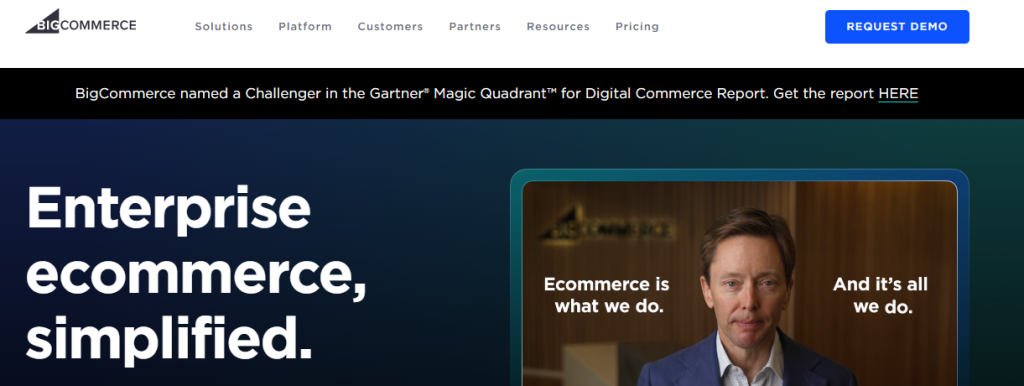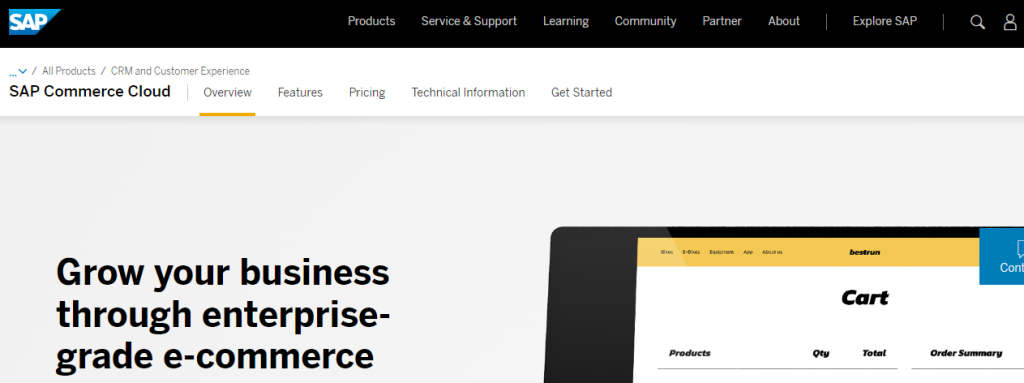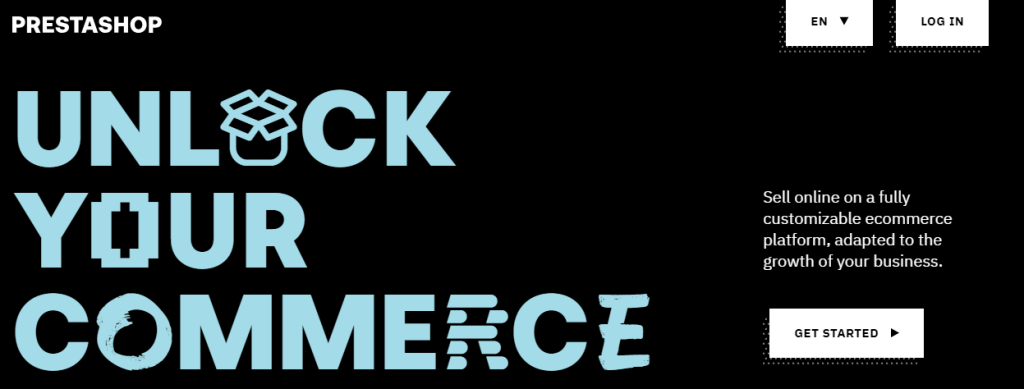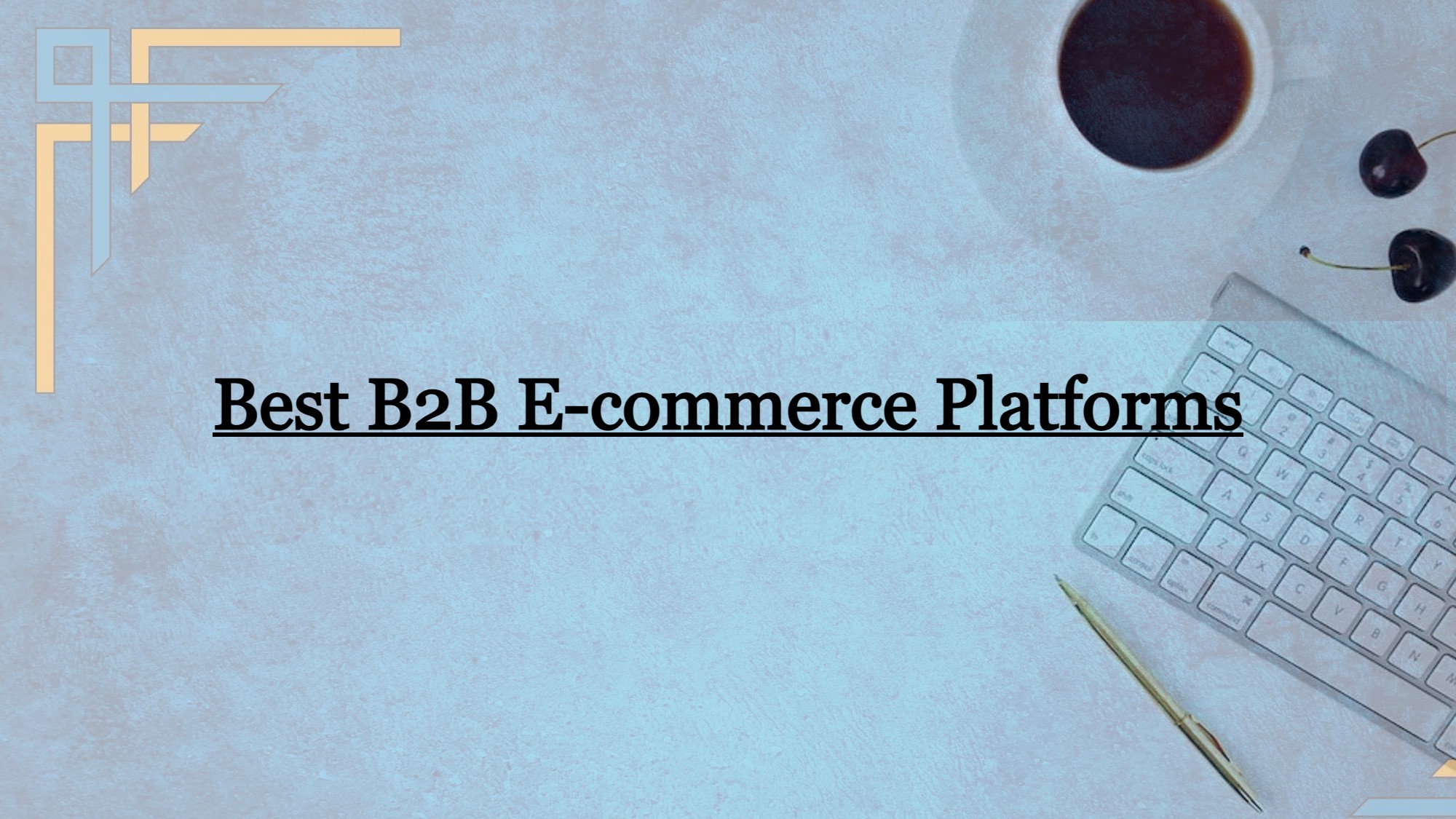In the dynamic realm of B2B e-commerce, selecting the right platform is crucial for streamlining operations, enhancing user experiences, and driving business growth. Let’s delve into the features and offerings of the top 10 B2B e-commerce platforms that stand out in the market.
Top 10 B2B E-commerce Platforms
Below is the list of top 10 E-commerce platforms.
1. Magento Commerce

Renowned for its flexibility and scalability, Magento Commerce empowers businesses with a highly customizable and feature-rich platform. With a focus on robust catalog management and a vast extension marketplace, Magento is ideal for businesses seeking tailored solutions and extensive integration possibilities.
Features
- Flexible Framework
- Scalable Performance
- Robust Security
- Extensive Customization
- Multi-Store Support
- Mobile Responsiveness
- Advanced SEO
- User-friendly Admin
- Integrated Payments
- Extensive Extensions
2. Shopify Plus

Shopify Plus is a robust and scalable enterprise-level e-commerce solution designed to meet the unique needs of high-growth and large businesses. As an advanced version of the popular Shopify platform, Shopify Plus provides a comprehensive suite of tools and features to empower businesses in the B2B and B2C sectors.
Features
- Scalable Growth
- Customizable Design
- Enterprise Security
- Dedicated Support
- Multi-Channel Selling
- Automated Operations
- Global Expansion
- Performance Analytics
- Reliable Uptime
- Innovative Updates
3. BigCommerce

BigCommerce stands as a robust and comprehensive e-commerce platform, empowering businesses to establish and grow their online presence with ease. Known for its extensive feature set and user-friendly interface, BigCommerce caters to a wide range of businesses, from startups to established enterprises.
Features
- Comprehensive Platform
- SEO Optimization
- Cross-Device Optimization
- Seamless Payments
- Expanded Reach
- Efficient Tracking
- Data-Driven Insights
- PCI DSS Compliance
- Flexible Growth
- Continuous Assistance
4. Oracle Commerce Cloud

Oracle Commerce Cloud caters to the diverse needs of B2B enterprises, offering a comprehensive suite of features that enhance user experiences, streamline operations, and facilitate global expansion. Its scalability, coupled with advanced personalization and omnichannel capabilities, positions it as a strategic choice for businesses navigating the complexities of the modern e-commerce landscape.
Get exclusive access to all things tech-savvy, and be the first to receive
the latest updates directly in your inbox.
Features
- Enterprise-Grade Capabilities
- Scalable Architecture
- Omnichannel Commerce
- Advanced Personalization
- Integrated Content Management
- Mobile Optimization
- AI-Powered Insights
- Robust Security Measures
- Efficient Order Management
- Cloud-Based Flexibility
5. WooCommerce

WooCommerce stands as a robust and widely adopted e-commerce plugin designed to seamlessly integrate with the WordPress content management system. Launched in 2011, it has since become a go-to solution for businesses seeking to establish and manage their online stores within the WordPress ecosystem.
Features
- WordPress Integration
- Flexible Customization
- Extensive Plugins
- Responsive Design
- User-Friendly Interface
- Built-In Payments
- Streamlined Catalogs
- SEO-Friendly
- Community Support
- Mobile Responsiveness
6. SAP Commerce Cloud

SAP Commerce Cloud is a powerful and comprehensive e-commerce solution tailored for businesses engaged in B2B transactions. As part of the SAP Customer Experience suite, this platform integrates seamlessly with other SAP solutions, offering advanced features and capabilities to meet the complex needs of large-scale enterprises.
Features
- High Performance
- Global Scalability
- Channel Integration
- Tailored Experiences
- Seamless Content
- Responsive Mobility
- Intelligent Analytics
- Secure Transactions
- Streamlined Orders
- Cloud Integration
7. PrestaShop

PrestaShop is a dynamic and user-friendly open-source e-commerce platform that has gained popularity for its flexibility and extensive customization options. As a feature-rich solution, PrestaShop caters to businesses of various sizes, providing the tools needed to create and manage successful online stores.
Features
- Open-Source Advantage
- Flexible Customization
- Vibrant Plugin Marketplace
- User-Friendly Interface
- Multilingual and Multi-Currency Support
- Mobile-Responsive Design
- Comprehensive Product Management
- SEO-Friendly Features
- Robust Security Measures
- Community Support
8. InsiteCommerce

InsiteCommerce is a dedicated e-commerce platform designed to meet the unique needs of B2B businesses. Recognizing the complexities of B2B transactions, InsiteCommerce provides a tailored solution that streamlines operations, enhances user experiences, and facilitates efficient interactions in the business-to-business realm.
Features
- B2B-Focused Capabilities
- Integration with Business Systems
- User and Role Management
- Multi-Site Management
- Efficient Order Processing
- Personalized Pricing and Catalogs
- Responsive Design
- Advanced Product Information Management (PIM)
- Dynamic Pricing Models
- Customer-Specific Workflows
9. Salesforce B2B Commerce

Salesforce B2B Commerce is a robust and comprehensive solution within the Salesforce ecosystem, specifically tailored to meet the unique needs of B2B transactions. This platform empowers businesses to create seamless, personalized, and efficient digital experiences for their B2B buyers, driving growth and success in the dynamic world of business-to-business commerce.
Features
- Unified Customer View
- Gain Comprehensive Customer Insights
- Personalized Buying Journeys
- Deliver Tailored Customer Experiences
- Scalable and Flexible Architecture
- Utilize an Adaptable E-commerce Infrastructure
- AI-Driven Product Recommendations
- Enable Intelligent Cross-Selling
- Integrated Sales and Service Processes
- Facilitate Seamless Collaboration
- Mobile-Optimized Design
- Ensure On-the-Go Accessibility
10. IBM Sterling Commerce

IBM Sterling Commerce is a comprehensive suite of solutions designed to enhance and streamline B2B (business-to-business) integration processes. Leveraging advanced technologies, this platform facilitates seamless collaboration, efficient supply chain management, and secure transactions, making it a preferred choice for businesses engaged in complex B2B operations.
Features
- Order Management
- Supply Chain Visibility
- B2B Integration
- Multi-Channel Fulfillment
- Global Trade Management
- Inventory Optimization
- Real-time Analytics
- Cross-Channel Order Fulfillment
- Customer Self-Service
- Automated Document Handling
- Scalable Architecture
- Compliance Management
- Dynamic Pricing
- Mobile Order Management
- EDI (Electronic Data Interchange)
FAQs – B2B E-Commerce Platforms
How does a B2B e-commerce platform differ from a B2C platform?
While B2C (Business-to-Consumer) platforms cater to individual consumers, B2B e-commerce platforms focus on serving the unique needs of businesses. They typically involve complex transactions, and bulk orders, and often require features such as multiple user roles, tiered pricing, and integration with enterprise systems.
What key features should I look for in a B2B e-commerce platform?
Important features include robust order management, secure payment processing, inventory management, B2B-specific pricing structures, seamless integration with other business systems, and tools for collaboration with suppliers and partners.
How can a B2B e-commerce platform improve efficiency in my business?
B2B e-commerce platforms automate various aspects of the buying and selling process, reducing manual errors and streamlining workflows. They enhance efficiency by providing real-time data, order tracking, and analytics, enabling businesses to make informed decisions quickly.
Is security a concern with B2B e-commerce platforms?
Yes, security is a critical consideration. Reputable B2B e-commerce platforms incorporate robust security measures, including data encryption, secure payment gateways, and compliance with industry regulations to protect sensitive business information and transactions.

Conclusion
In conclusion, B2B e-commerce platforms have emerged as indispensable tools in the modern business landscape, catalyzing a paradigm shift in the way enterprises conduct their transactions. These platforms go beyond simple online storefronts, offering a myriad of features and functionalities designed to streamline complex business processes, enhance collaboration, and foster seamless transactions between businesses.
The ability to automate tasks, optimize supply chain management, and provide real-time analytics empowers organizations to operate with unprecedented efficiency and agility.



